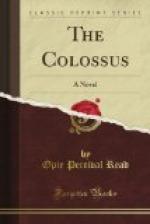“Your father and mother now live in Chicago. George Witherspoon is one of the great merchants of that city, and is more than a millionaire. This is why I have so often told you that one day you would be worth money. You were young and could afford to wait; I was old, and to me the present was everything, and you were the present.
“For some time I have been threatened with sudden death; I have felt it at night when you were asleep; and now I have written a confession which for years I irresolutely put aside from day to day. I charge you to bury me as Andrew Witherspoon, for in the grave I hope to be myself, with nothing to hide. Write at once to your father, and after settling up my affairs, which I urge you not to neglect, you can go to him. In the commercial world a high place awaits you, and though I have done you a great wrong, I hope that your recollection of my deep love for you may soften your resentment and attune your young heart to the sweet melody of forgiveness.
“Andrew Witherspoon.”
DeGolyer folded the paper, returned it to Henry and sat in silence. He looked at the smoking lamp and listened to the barking of the hungry dogs.
“What do you think, Hank?”
“I don’t know what to think.”
“But ain’t it the strangest thing you ever heard of?”
“Yes, it is strange, and yet not so strange to me. It is simply the sequel to a well-known story. In the streets of New Orleans, years ago, when I could scarcely carry a bundle of newspapers, I cried your name. The story was getting old then, for I remember that the people paid but little attention to it.”
They sat for a time in silence. Young Witherspoon spoke, but DeGolyer did not answer him. They heard a guitar and a Spanish love song.
“Yes, it is strange,” said DeGolyer, coming hack from a wandering reverie. “It is strange that I should be here with you;” and under a quickening of his newspaper instincts, he added, “and I shall have the writing of it.”




